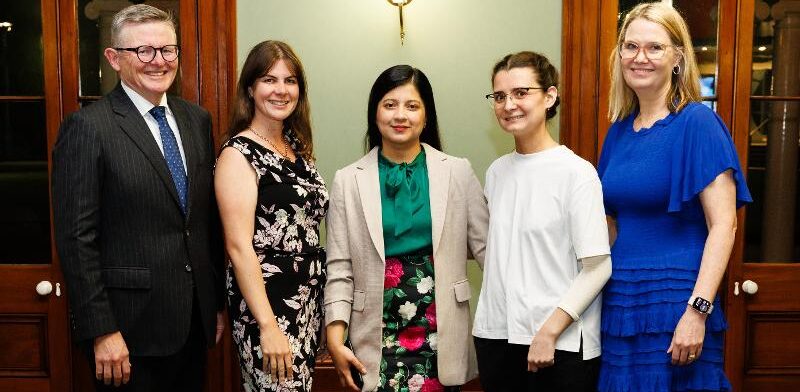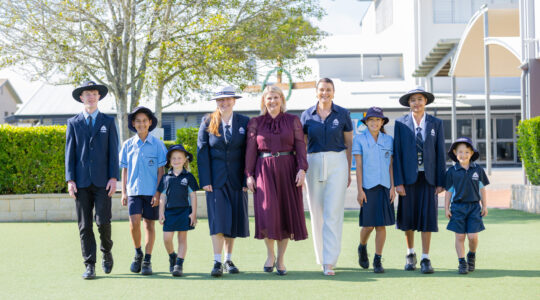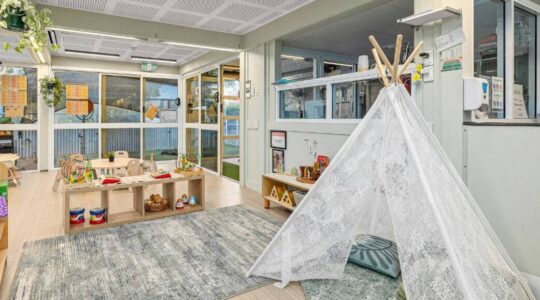The resources and renewable sector is one step closer to becoming more sustainable with innovations from the first winners of the prestigious Michael Roche Scholarship designed to create practical solutions for environmental challenges.
The winners say their lives have been changed by the $20,000 travel scholarship established by law firm McCullough Robertson in 2021 for QUT PhD students researching the natural environment, sustainability or climate change solutions.
Michael Roche, 64, died in 2019 and was a respected strategic advisor at McCullough Robertson, specialising in mining industry developments.
He was the former Queensland Resources Council chief executive for 11 years, a senior executive at the ASX, and a former chief of staff to Labour treasurer Keith de Lacy during the Goss government.
McCullough Robertson joint managing partner and joint lead of Resources and Renewables Damien Clarke said it was inspiring to see the impact of the scholarship in a short period of time.
“We remain incredibly proud to honour Michael’s legacy in a way that reflects his deep commitment to Queensland’s resources and renewables industry, and supports the next generation of leaders,” Mr Clarke said.
“It has been inspiring to see the scholarship already driving critical research projects with the potential to shape and strengthen the sector.
“We remain committed to fostering this innovation and building lasting, meaningful partnerships with each scholar as they contribute to the future sustainability of the industry.”
Ashara Miles (nee Moore), 2022 winner:
Ashara Miles’ PhD project focuses on sustainable management of mining waste through enhanced geochemical treatments.
This means investigating ways to combine multiple waste streams from the renewables sector into a soil-like product that can be used for rehabilitation purposes.
As part of the scholarship, Ms Miles was able to travel to international conferences which she said was “enlightening” and helped guide her project in a positive direction.
“I did not want to just do something for the sake of interest or a piece of paper; I wanted to do something that could be used to better our industry,” Ms Miles said.
She is currently a tailings dam professional at BHP Mitsubishi Alliance, and leads a team of engineers and scientists responsible for maintaining the structural integrity of tailings and water dams across five central Queensland mining sites.
She has also received the BHP Women in Resources Award 2004, and Women in Industry for Excellence in Mining 2003.
Sofia Faershtein, 2023 winner:
Ms Faershtein’s research focus is on metallurgical waste recycling, specifically through transforming red mud (bauxite residue) which is currently considered hazardous, into a polymer composite able to be used in construction and road repairs.
“It’s quite a hazardous material because of its high alkalinity, which can influence the healthy plants growing on the soil aeration and water movement inside the soil,” Ms Faershtein said.
“This material is stockpiling on the land, but we want to use it as a construction material.”
As part of the scholarship, she was able to attend a professional materialographer workshop at Struers Australia which helped her acquire specialised skills for conducting unique experiments.
She also joined industry experts at the Australian Mine Waste Symposium where she gained insights into research and environmental safety techniques.
Ms Faershtein hopes to present her work at an international conference next year.
When she finishes her PhD she hopes to repurpose secondary materials currently considered hazardous waste.
Erandi Prangige, winner 2025:
Dr Prangige is exploring how mining waste can be transformed into valuable products – specifically as precursors for solar cells.
Dr Prangige is based at QUT and works closely with industry partner Lava Blue and project lead Professor Sara Couperthwaite.
She is confident their work will have strong demand, particularly in Queensland, with the aim to take the technology to the US and Europe.
“We have so much sunlight here, which gives us incredible potential for sunlight-driven projects, and we’re developing technology that could be a game-changer,” she said.
“The scholarship opens so many doors.
“It allows me to attend international and domestic conferences where I can share our work, connect with others in the field and explore new collaboration opportunities.”
The scholarship also supports the involvement of two PhD students on the project, providing them with crucial opportunities to present their research and build their professional networks.








